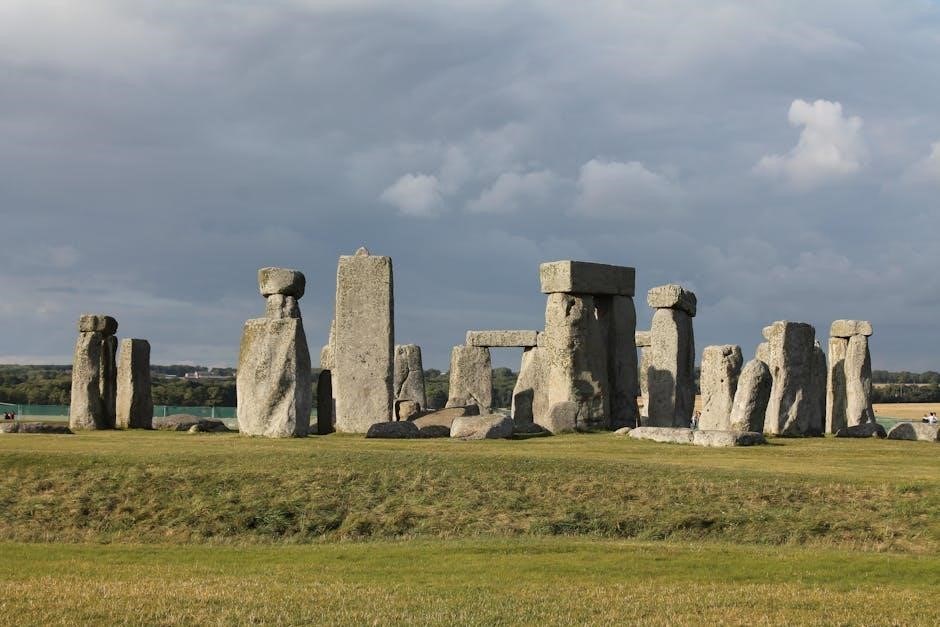The World’s Religions by Huston Smith is a definitive classic exploring the essential teachings of major faiths like Hinduism‚ Buddhism‚ and Islam‚ offering profound insights into global spirituality․
Significance and Overview of Huston Smith’s Work
Huston Smith’s The World’s Religions is a seminal work that has shaped the study of comparative religion for decades․ First published in 1958‚ it remains a cornerstone for understanding the diverse faiths of humanity‚ including Hinduism‚ Buddhism‚ Islam‚ and others․ Smith’s approach emphasizes the unique contributions of each religion‚ fostering empathy and insight․ His balanced perspective‚ free from bias‚ has made the book a trusted resource in academic and spiritual circles․ Over the years‚ revised editions have updated its content‚ ensuring its relevance in a changing world․ This timeless classic continues to inspire seekers of wisdom and scholars alike‚ offering a profound exploration of global spirituality․
Overview of Major World Religions
The World’s Religions by Huston Smith provides a comprehensive introduction to major faiths‚ including Hinduism‚ Buddhism‚ Islam‚ and Christianity‚ offering insights into their core beliefs and practices․
Huston Smith’s The World’s Religions delves into the core beliefs and practices of major faiths‚ including Hinduism‚ Buddhism‚ Confucianism‚ Taoism‚ Judaism‚ Christianity‚ and Islam․ Each chapter explores the unique philosophical foundations‚ rituals‚ and cultural influences of these traditions‚ while also examining primal religions and their significance․ Smith’s approach emphasizes understanding the diverse ways humanity seeks meaning and connection‚ offering insights into the shared values and distinct perspectives of global spirituality․ This comprehensive overview bridges cultural and theological divides‚ fostering appreciation for the world’s wisdom traditions․
Hinduism
Hinduism‚ explored in Huston Smith’s work‚ encompasses diverse philosophical traditions‚ emphasizing the four paths to God‚ stages of life‚ and the concept of dharma‚ central to its spiritual framework․
Key Tenets and Philosophical Foundations
Hinduism‚ as explored in Huston Smith’s work‚ revolves around the concept of dharma (duty) and the pursuit of moksha (liberation)․ It emphasizes the four paths to God: Jnana Yoga (knowledge)‚ Bhakti Yoga (devotion)‚ Karma Yoga (action)‚ and Raja Yoga (meditation)․ The philosophy is rooted in the Vedas and Upanishads‚ exploring the ultimate reality of Brahman and the individual self (Atman)․ The concept of samsara (reincarnation) and karma (causal law) underpins its ethical framework․ Smith highlights the diverse traditions and the stages of life (ashramas)‚ illustrating Hinduism’s rich and complex spiritual tapestry․
Buddhism
Buddhism‚ founded by Siddhartha Gautama‚ teaches the Four Noble Truths and the Eightfold Path to end suffering․ It emphasizes mindfulness‚ compassion‚ and achieving Nirvana through self-realization․
Core Teachings and Practices
Buddhism centers on the Four Noble Truths: the existence of suffering‚ its causes‚ its cessation‚ and the path to cessation․ The Eightfold Path guides ethical conduct‚ mental discipline‚ and wisdom․ Practices include meditation‚ mindfulness‚ and cultivating compassion․ The ultimate goal is Nirvana‚ liberation from the cycle of rebirth․ Huston Smith highlights these teachings as a universal quest for inner peace‚ emphasizing Buddhism’s practical approach to achieving enlightenment through personal transformation and self-reflection․ His work underscores the timeless relevance of Buddhist principles in fostering harmony and understanding across cultures․

Confucianism and Taoism
Confucianism emphasizes ethics‚ social harmony‚ and education‚ while Taoism focuses on natural balance and inner peace through the concept of wu-wei (effortless action)․ Huston Smith explores their unique spiritual contributions․
Philosophical and Religious Concepts
Confucianism and Taoism offer distinct philosophical frameworks․ Confucianism‚ rooted in the teachings of Confucius‚ emphasizes ethical behavior‚ social responsibility‚ and the cultivation of virtue․ It advocates for harmony within society through rituals and moral codes․ Taoism‚ inspired by Lao Tzu‚ explores the Tao‚ the ultimate reality and natural order of the universe․ It promotes a life of simplicity‚ balance‚ and alignment with nature․ Both traditions‚ while differing in focus‚ share a commitment to achieving harmony—Confucianism through human relationships and Taoism through individual alignment with the cosmic order․ Huston Smith highlights their enduring influence on East Asian thought and spirituality․

Judaism
Judaism‚ rooted in monotheism‚ emphasizes the covenant between God and Abraham․ The Torah guides moral and ritual practices‚ with traditions like Sabbath and dietary laws central to faith․ Smith highlights its enduring influence as a foundation for Abrahamic religions․
Essential Beliefs and Practices
Judaism‚ rooted in monotheism‚ centers on the covenant between God and the Jewish people‚ emphasizing divine revelation through the Torah․ Essential practices include observance of the Sabbath‚ dietary laws (kashrut)‚ and sacred rituals․ The Torah guides moral and ethical living‚ while traditions like prayer and study foster communal identity․ Huston Smith highlights Judaism’s enduring legacy as a foundation for Abrahamic religions‚ stressing its focus on covenantal responsibility and the pursuit of justice․ These beliefs and practices form the heart of Jewish spirituality and community life‚ shaping a rich and resilient faith tradition․
Christianity
Christianity centers on the life‚ teachings‚ death‚ and resurrection of Jesus Christ‚ viewed as the Son of God and savior of humanity․ Huston Smith highlights its core doctrines‚ including the Trinity and divine grace‚ emphasizing love and redemption as central to its message․
Central Doctrines and Influence
Christianity’s core doctrine revolves around the Trinity: Father‚ Son‚ and Holy Spirit․ Huston Smith emphasizes Jesus Christ’s dual nature—fully divine and human—and his resurrection as humanity’s salvation․ The doctrine of grace underscores God’s unconditional love‚ central to Christian faith․ Smith highlights Christianity’s profound influence on Western civilization‚ shaping ethics‚ art‚ and culture․ Its teachings on compassion‚ forgiveness‚ and love have inspired moral frameworks globally‚ making it a cornerstone of human spirituality and societal values‚ as explored in The World’s Religions․

Islam
Islam‚ centered on the Quran and the Five Pillars‚ emphasizes submission to Allah․ Huston Smith highlights its monotheistic core‚ moral guidance‚ and global community‚ offering insightful perspectives in The World’s Religions․
Founding Principles and Practices
Islam is rooted in the absolute oneness of Allah (Tawhid) and submission to His will․ The Five Pillars—Shahada (faith declaration)‚ Salat (daily prayer)‚ Zakat (charity)‚ Sawm (Ramadan fasting)‚ and Hajj (pilgrimage)—guide Muslim life․ The Quran‚ revealed to Prophet Muhammad‚ and the Hadith (his teachings) form the foundation․ Huston Smith highlights Islam’s emphasis on moral accountability‚ community‚ and the pursuit of justice‚ illustrating its profound impact on billions worldwide․ These principles shape Islamic ethics‚ worship‚ and societal norms‚ fostering a balanced spiritual and practical way of life․
Primal Religions
Primal religions emphasize traditional practices‚ oral traditions‚ and symbolic beliefs‚ often tied to nature and community․ Huston Smith explores these indigenous traditions‚ highlighting their universal spiritual significance․
Traditional Practices and Beliefs
Primal religions‚ as explored by Huston Smith‚ are rooted in ancient traditions and beliefs‚ often passed down through oral storytelling․ These practices emphasize harmony with nature‚ ritual ceremonies‚ and the interconnectedness of all life․ Smith highlights the symbolic mind and the role of sacred sites‚ such as the Australian Aboriginal experience‚ where land and spirituality are deeply intertwined․ These traditions‚ though varied‚ share a common thread of seeking meaning and connection through communal rituals and a reverence for the natural world․ Smith’s work underscores their enduring relevance in a modern context․

Comparative Analysis and Reflections
Huston Smith’s comparative approach reveals the unique contributions of each religion while highlighting shared human experiences‚ fostering understanding and appreciation of diverse spiritual traditions․
Smith’s Insights and Comparative Approach
Huston Smith’s work in The World’s Religions offers profound insights into the diverse faiths‚ emphasizing their unique contributions while highlighting shared human experiences․ His comparative approach encourages readers to appreciate the richness of each tradition‚ fostering mutual respect and understanding․ Smith’s methodology bridges cultural and theological divides‚ providing a framework to explore the essence of spirituality across religions․ By examining the core teachings of Hinduism‚ Buddhism‚ Christianity‚ Islam‚ and others‚ Smith reveals the universal quest for meaning and transcendence‚ making his work a cornerstone of religious studies and interfaith dialogue․
